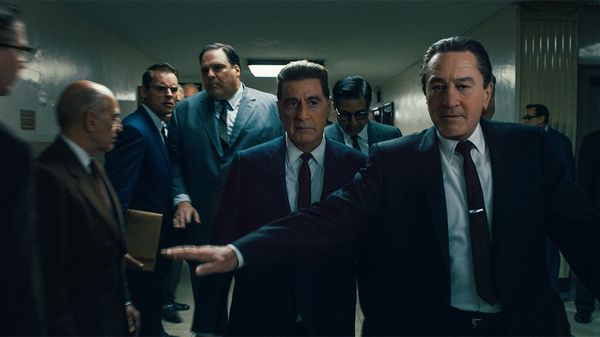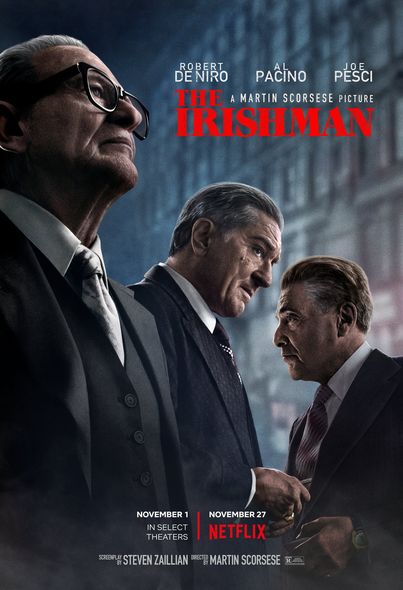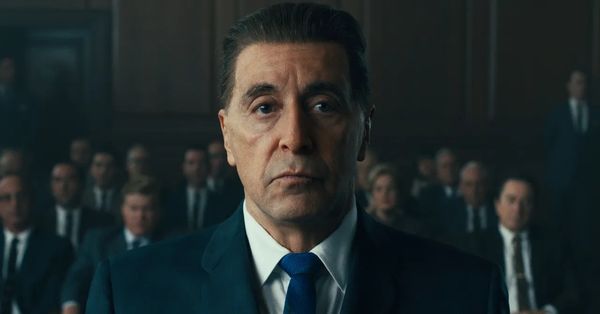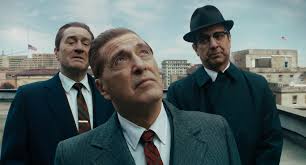The Irishman (2019)

The Irishman is a sprawling, epic crime drama directed by Martin Scorsese, released in 2019. The film stars Robert De Niro, Al Pacino, and Joe Pesci, and is based on the true story of Frank Sheeran, a hitman who claimed to have been involved in the disappearance of labor leader Jimmy Hoffa. The film spans several decades, exploring themes of loyalty, regret, and the moral complexities of a life lived in organized crime.
The narrative unfolds through the perspective of Frank Sheeran (Robert De Niro), who recounts his life as a hitman for the Bufalino crime family. As he rises through the ranks, he becomes closely associated with Hoffa (Al Pacino), the powerful president of the Teamsters union. The relationship between Frank and Hoffa is central to the story, showcasing the dynamics of power, friendship, and betrayal within the world of organized crime.

One of the film’s notable aspects is its exploration of aging and the passage of time. Scorsese employs de-aging technology to portray the characters at various stages of their lives, allowing the actors to seamlessly transition between younger and older versions of themselves. This technique adds a layer of complexity to the narrative, as viewers witness the characters’ evolution and the consequences of their choices over time.

Robert De Niro delivers a nuanced performance as Frank, capturing the character’s internal conflict and emotional detachment. His portrayal evokes a sense of melancholy, reflecting the weight of his actions and the isolation that accompanies a life of crime. Al Pacino’s performance as Hoffa is equally compelling, bringing a fiery charisma to the role. Pacino effectively conveys Hoffa’s larger-than-life personality, as well as the vulnerability that lies beneath his bravado.

Joe Pesci’s portrayal of Russell Bufalino is a significant departure from his typical roles. Pesci delivers a restrained yet powerful performance, embodying the quiet menace and calculated nature of the mob boss. The dynamic between Pesci and De Niro adds depth to the film, illustrating the complex relationships within the criminal underworld.

Scorsese’s direction is masterful, employing a deliberate pacing that allows for character development and reflection. The film’s cinematography, shot by Rodrigo Prieto, captures the textures of the various settings, from the gritty streets of post-war America to the opulence of mob gatherings. The score, featuring music by Robbie Robertson, complements the film’s tone, enhancing the emotional resonance of key moments.
The Irishman is also notable for its thematic depth. It examines the cost of loyalty and the implications of a life of violence, ultimately posing questions about morality and redemption. Frank’s reflections on his past serve as a meditation on the choices he made and the relationships that were irrevocably altered by his actions.
Upon its release, The Irishman received critical acclaim, earning several Academy Award nominations, including Best Picture, Best Director, and Best Supporting Actor for Pacino. Its rich storytelling and exploration of complex themes have solidified its place as a significant work in Scorsese’s filmography and in the broader landscape of American cinema.
In conclusion, The Irishman is a profound and ambitious exploration of organized crime, loyalty, and the passage of time. Through the compelling performances of De Niro, Pacino, and Pesci, and Scorsese’s masterful direction, the film offers a reflective look at the moral complexities of a life intertwined with crime. Its blend of historical narrative and personal reflection makes it a powerful addition to the genre, inviting viewers to contemplate the choices that define a life and the legacy left behind.











